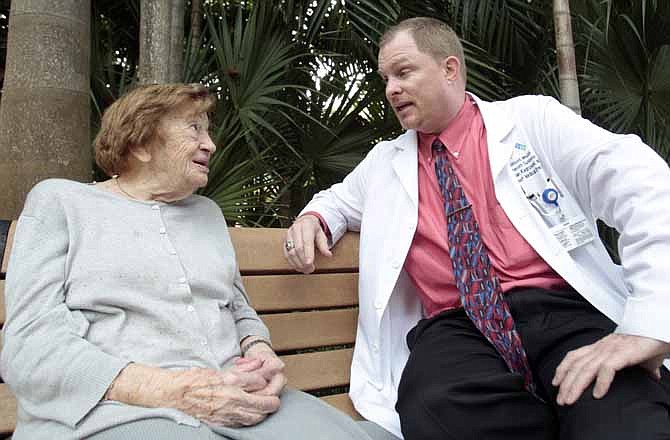PALATKA, Fla. (AP) - In this sleepy, riverside town in northeast Florida, 86-year-old Betty Wills sees the advertisements of obstetricians and gynecologists on the main road's billboards and has found specialists ranging from cardiologists to surgeons in the phone book.
But there's not a single geriatrician - a doctor who specializes in treating the elderly - in all of Putnam County, where a fifth of the county's 74,000 people are seniors.
"I looked," Wills said. "I didn't find one."
It's a nationwide shortage and it's going to get worse as the 70 million members of the baby-boom generation - those now 46 to 65 - reach their senior years over the next few decades.
The American Geriatrics Society says today there's roughly one geriatrician for every 2,600 people 75 and older. Without a drastic change in the number of doctors choosing the specialty, the ratio is projected to fall to one geriatrician for every 3,800 older Americans by 2030. Compare that to pediatricians: there is about 1 for every 1,300 Americans under 18.
Geriatricians, at their best, are medicine's unsung heroes. They understand how an older person's body and mind work differently. They listen more but are paid less than their peers. They have the skills to alleviate their patients' ailments and living fuller, more satisfied lives.
Though not every senior needs a geriatrician, their training often makes them the best equipped to respond when an older patient has multiple medical problems. Geriatricians have expertise in areas that general internists don't, including the changes in cognitive ability, mood, gait, balance and continence, as well as the effects of drugs on older individuals.
But with few doctors drawn to the field and some fleeing it, the disparity between the number of geriatricians and the population it serves is destined to grow even starker.
"We're an endangered species," said Dr. Rosanne Leipzig, a renowned geriatrician at Mount Sinai Medical Center in New York.
Geriatricians rank among the lowest-paid medical specialties, with a median salary of $183,523 last year, according to the Medical Group Management Association, which tracks physician pay. That sounds like a lot, but many other specialties pay two or three times more, while the average doctor graduates with $160,000 in student loan debt.
Just 56 percent of first-year fellowship slots in geriatrics were filled last academic year, according to a University of Cincinnati study, while the number physicians on staff at U.S. medical schools' geriatric programs has generally been trending downward.
Many young doctors aren't receiving even basic training in caring for older patients. Only 56 percent of medical students had clinical rotations in geriatrics in 2008, according to the study.
Various efforts around the country have aimed to increase both those choosing the geriatrics specialty and the level of training all doctors get in treating older patients.
The federal health overhaul law also includes a number of provisions aimed at increasing geriatric care. Last year, under the law, 85 grants totaling $29.5 million funded a range of geriatrics training programs for doctors, dentists, mental health professionals and other medical workers.
For now, though, the shortage continues.
"The shifting demographics is causing other primary care physicians to focus more on frail older adults but they do not have the training or experience to manage complex older adults with multiple chronic diseases," said Dr. Peter DeGolia, director of the Center for Geriatric Medicine at University Hospitals Case Medical Center in Cleveland.
Karen Roberto, director of the Center for Gerontology at Virginia Tech, said doctors who aren't trained in geriatrics might have a tendency to discount an older person's problems as normal symptoms of aging, when in fact they can be treated. She receives calls from people around the state looking for geriatricians, but oftentimes can't offer a recommendation.
"Going from specialist to specialist is not the answer," she said. "Older adults need providers with comprehensive knowledge of their problems and concerns."
For Wills, she moved with speed around the Edgar Johnson Senior Center, cooking lunch and sweeping the floor before her line dancing class began.
Wills joked about having outlived a number of her doctors, and how Jack Daniels sometimes is the best medicine. She wasn't sure a geriatrician would have all the answers, but she thought they might understand a woman of her age better than other doctors. She was unsuccessful finding one in her county.
"They depend on tests, they depend on machines, they depend on pills," she said. "Sometimes listening to you is better than hooking you up to machines."

